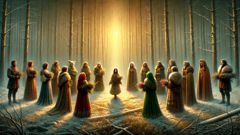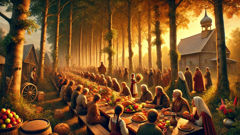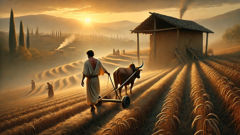Introduction
The village lay in a hollow between pines and birch, a handful of thatched roofs breathing pale smoke into an indifferent winter sky. Even the river had learned to sleep, a ribbon of glass beneath an attic of ice. In the oldest house, where the lane bent like the elbow of a mother, lived a girl who kept a steady light in whatever season she found herself: Marfa. Her stepmother, stern as frozen bark and twice as sharp, treated Marfa as if goodness were a fault to be punished. But Marfa had a small, stubborn mercy: she fed birds from her palm, hummed to the kettle that sang on the stove, and gathered nettles for neighbors with twisted knees. One bitter morning, when frost bleached the windowpanes and the snow lay so deep the road seemed only a rumor, the stepmother said with a mouth made of thin iron: fetch me violets, fresh water from the spring, and a loaf with the gold crust like the midday sun—or you shall not keep your woolen shawl. Marfa, who had only a small shawl and a heart that trembled like a trapped lark, wrapped her fingers and walked out. The world answered in whispers: a rabbit's pawprint, a fox's tail vanishing through a draped birch, the hush of months folding over themselves. She did not know then that each month had a face and a step, a memory of weather tucked into the pocket of its coat. She did not yet know that the Twelve, who keep the measure of days, would gather—one by one—to help a soft-handed girl meet tasks that should not have been possible in a season that was not meant for them. But the land remembers what generosity looks like; and even a cruel stepmother, who measures worth by the weight of bread, cannot count those who answer a single kind heart.
The Winter's Demand and the First Meetings
Marfa moved through the village as one moves through thoughts: quietly, as if not to wake them. Her stepmother's voice had been a bell that fractured into orders, and the first was impossible enough to freeze breath in the throat—violets in the middle of an iron winter. Still she walked beyond the last cottage, past the bone-bare apple tree, and toward the forest that held the village like an arm. Snow made the world soft and anonymous; footprints were commas and sentences vanished in the next passing wind.

She found the spring because sometimes the earth remembers its own kindness. It sat in a hollow, rimmed with ice that tinkled like tiny glass bells. The well-house lid was heavy with snow. Marfa, who could not lift a lid of such hunger for another's needs, whispered to the place as she would to an injured bird. If anyone should find the story surprising—how a human voice could coax a year—then let them know the country had not forgotten that months were more than measures. They were old, and when called upon by warmth or need, they answered with their faces turned as if to an old friend.
It was January who came first, and he was a small man folded in white, eyes like polished coal, and breath that fogged the air. He lifted the lid without force, as if he simply remembered how to tilt the world. "You should not be here in a dress, child," he said, a kind voice with the hardness of icicles. "But what breaks the winter's law must have a good reason." He tapped the spring with a knuckle and the frozen surface shivered, then bled into a stream. In Marfa's palm the water was as cold as truth. "Take this," January said. "It will stay sweet if you give thanks for its life."
Marfa bowed, curling her fingers around the chill. The thought of violets made a kind of ache in her chest; flowers were the language of spring and her stepmother had asked for them like someone who did not think the seasons took turns. "Will it ever be warm enough?" she asked, not brave, only honest.
January smiled in the way snowflake patterns smile: different on each edge but patient in design. "Not by me, child. But we know how to pass the sun along. Come when the frost thins; return when the wind is less a blade. Walk with the seasons, and they will show you where to stand."
And so Marfa came to stand in a circle she didn't yet see, where one month touched the next by the tip of its sleeve.
February came with a laugh like bells in a thaw. He braided icicles into rills and cupped a handful of powdered blue sky for Marfa to breathe. "Violets are hidden under grief of snow," he said. "They sleep like children. We'll coax them awake."
The months arrived one by one, at intervals like the passing of a bell down a steeple. March had wind in his hands and a stubborn crocus tucked behind one ear. April came with wet skirts and a ready mischief; she took Marfa's palm and placed a small handful of warmth there. May arrived as an old friend who hugged the shoulders of the world and asked if the soil wanted to remember how to grow. Each gave her something: a scrap of warmth, a promise that antennas on nests would hold, a shove to the sleeping bulbs beneath the snow. Marfa learned to listen to seasons the way a child learns the cadence of a story. The months taught her the language of time.
Yet the stepmother's demands were not satisfied by promises. The second task was more terrible: fill a basket with strawberries for a lord who would pass through the village by night, and bring them by morning. "Strawberries in winter?" said a neighbor with a pitying glance that warmed nothing. "You must be foolish to ask it, woman."
But Marfa had tasted the sweet water the months carried and she believed in the possible again. She went into the twilight while the months gathered like a council around a bonfire of patience.
June arrived with the green of grass stitched into his coat and the scent of first-ripe cherries in his hair. He hummed a tune that made the ground remember exactly where it kept its treasure. "We will bring you what the stepmother thinks impossible," he said, collar tipped with dew. July, who carried the heavy fruit of the late fields and wore the sun like a cloak, set a circle of warmth where the strawberry beds should be. August, broad-shouldered and full of harvest-laughter, scattered a handful of long-silenced bees who buzzed around Marfa's fingers like tiny, grateful questions.
It was not magic that tricked the world into bringing strawberries; it was an arrangement older than greed. Summer months bent the day's light until it pooled in a hollow, and there small fruit grew as if time had donated a day to the task. Marfa gathered what shone like little rubies, arranged them with the care of someone who had recently learned how fragile miracles are, and ran home with the basket balanced on her arm like a prayer.
The stepmother took the strawberries and tasted them as if she tasted guilt. She did not smile. Instead, she crinkled her nose and gave Marfa a third order: bring me wildflowers that never bloom in the valley, and a loaf so browned it would pass for gold. "You will fail sooner than you try," she said, eyes like knives. "And then you'll learn not to be clever."
Marfa's cleverness was quiet. She had no riches except that she could ask kindly, and for kindness, the months answered. They gathered in a wood that smelled of moss and old rain, feet making no sound as if they had been taught to walk like cloud. September brought cool practicality and an eye for where rare flowers lingered. October walked with a basket of fading light and a map of where last year's stars had dropped seeds. November brought a thin humor and the smell of late mushrooms, pointing where a lonely slope caught frost later than the rest. They spoke to her of patience and of the places in the world that remember a month later than the rest.
Then, when the stepmother's door was closed and the night swallowed the smoke from the chimneys, the months stepped aside like teachers finishing a lesson. "Remember," said March as he tapped Marfa's wrist with a wind-worn finger, "some things grow only if you've asked the earth with your feet and your hands and your heart." She carried the map of the months in the hollow of her palm and when she picked the flowers they seemed to bend toward gratitude.
As for the golden loaf, December folded himself over the oven as if he were both baker and fire. He had fingers stained with soot and stories of hearths. With a crackle and the scent of spice, he taught Marfa how to pat a dough with care that bordered on reverence, how to whisper warmth into a bread while it rose. "Courage to knead is a small kind of bravery," he said. "People think courage must be loud; often it's the patience to wait through cold."
Marfa returned with a basket of impossible flowers looking like a bouquet pinched from several seasons and a loaf whose crust caught the lamplight and flamed like a small, honest sun. Still, the stepmother's face remained a mask of iron and hunger. She ordered one last trial—one so pointed that the villagers felt it was an affront to the calendar itself. If Marfa could bring snow in the heat of summer to a feast, or the tongues of green leaves in the hollow of winter, then she might serve the household another week. The stepmother's cruelty was a measuring rod she swung to keep kindness small.
Word of Marfa's errands travelled like a thin, resilient ribbon through the houses and the fields. Those who had hearts a little softer—an old potter who mended jars, a milkmaid with soap on her hands, a woodsman who whistled to his axe—began to leave small gifts at the threshold: a ribbon, a pinch of salt, a berry preserved in sugar. The months watched as if approving the practice, as if pleased that human hands still remembered civility despite a house that refused it.
Marfa went to each month when she could. She did not ask for blessings or rewards. Instead she offered gratitude, and the months give favors in return to those who know how to say thank you. They taught her how to pool frost into a bowl that would not melt, how to fold summer's scent into a jar that sang when shaken, how to coax warmth into a bread until its skin shone like a promise. Her tasks were impossible until the calendar itself decided otherwise. The months, who had seen centuries of people think seasons were strict and heartless, softened as they watched her quiet courage. They liked how she folded her hands when she prayed and how she pinned her courage to an insignificant shawl.
Night after night the months walked back to their places around the world, but not before each kissed Marfa's brow with a weathered promise: return and the world will answer. By the time she had all the things the stepmother demanded, Marfa's shawl was still on her shoulders, but the house felt different to her; it had become a place containing a story. The stepmother could not contain that story, not fully. And stories, like seasons, find cracks and warm them.
Trials, Triumph, and the Measure of Seasons
The stepmother measured each offering like a judge weighing a coin. The strawberries were perfect and tasted of summer sequestered by a miracle, yet she pinched the bread's crust as if it hid something. Still she sent Marfa out again: sweep the frost from the church steps at dawn and find me a necklace of moonlight. The villagers looked on as if watching a play where they already knew the end, but life rarely follows the scripts we expect. Marfa now walked with the months in her pocket like a remembered lullaby. She started at midnight and went among the roofs, carrying the little loaf. The church steps were riven with ice; morning light lay across them like a promise and a hush. Marfa took the loaf and flung it down like an offering. The crust cracked and the smell rose like prayer. It warmed the stone, coaxing away the ice as if the loaf had the patience of many suns. The steps cleared as if remembering their duty to receive feet. A dozen villagers watched with their shawls held tight but their faces loosening a little.

The moonlight necklace was a different matter. You cannot braid the sky without a trick. Marfa went out to the river where the night was a deep cloth, folded and safe. There she met September, who walked as if carrying the last gold of leaves, and November, slender and quick, who always seemed to have a joke to spare. They sat beside her and taught her how to string moon-beams into a pattern; it required patience and a pocket of silence. "You gather moonlight best when your hands are not thinking of owning it," said November. "First you must be light yourself."
So she learned to be feather-soft in her want. She cupped the moon in a bowl of black cloth and then coaxed it into a thin strand with a song a month hummed under its breath. The necklace shivered but did not vanish. Moonlight likes to be worshipped carefully.
Yet the most dangerous test was the one the stepmother devised for the feast. She called for winter's drift to cloth the hedges in mid-July, and ordered Marfa to bring back a handful of snow as proof. The stepmother wanted spectacle: she wanted her neighbors to bow at her capacity to command the world. Marfa felt a hollow fear then, a cold that had nothing to do with weather. The months, however, understood that cruelty asking for spectacle needs an answer that teaches restraint.
They met in a field where the grass had gone tall with July and dragonflies made the air tremble. August stooped so that Marfa could see his palms where little bells of late dew remained. He touched the earth and whispered to it the names of past winters the ground had absorbed. "We may borrow but we won't steal time," he said. "We must be careful when we return what we've borrowed."
They gathered frost in small flasks and folded it into silk. June and July worked like careful men patching a cloak; they kept the cold wrapped in summer's breath so it wouldn't swallow the day. When Marfa presented the snow, it was not a theft of the year; it was a covenant: cold contained and offered with honor. The hedges took the snow like a courtesy, and the feast was a bewilderment of guests who thought the world could be ordered by someone with a lock and key for a heart.
As the village watched these marvels, some began to question the stepmother's sense of worth. How could a woman of such small mercy ask such large things? The months, who have the advantage of long perspective, saw in her a brittle hunger that comes from thinking that abundance is a scarcity to be hoarded. They had seen many who tried to bind the year's generosity to their own table; the years always answer in ways that teach humility.
Marfa continued to move through the calendar. Each task the stepmother devised became an opportunity for the months to educate the village about balance. October brought late apples to a basket that had long been empty. April arranged for a small patch of violets to bloom under a hedgerow by the road, where the frozen memory of winter had been soft enough to hold new life. The villagers began to talk differently: they left an extra piece of bread for the stranger, and when the potter dropped a bowl he didn't curse and throw away but mended it with reverence. A culture that had once hidden kindness like a secret began to show it in small, deliberate gestures.
It was in the end, when the stepmother set the last and cruellest trial—give me a sugar-sweet casket full of midsummer stars and the hush of the first snow at the crack of noon—that the measure of the months and the measure of hearts were finally tested. The stepmother intended to pin Marfa like a specimen and shame her before everyone. Instead the months took the mean wind out of such plans. They refused to turn the world into a puppet stage. Instead they taught Marfa a final lesson: not all impossible things are right to grant if granting them costs the balance of the year.
Marfa understood then the difference between abundance and spectacle. She told the stepmother with a voice that was neither small nor loud that she could not trade the months' gifts for a show. "I have asked them for what I needed to keep life whole," she said. "I have not asked them to undo themselves for a boast." The villagers listened as if they had been waiting for someone to say what they felt. The stepmother's face grew red like a late apple bruised by cold. Her appetite for mastery, which was always a hunger for applause, found no purchase. The months had supported a girl's quiet courage but would not grovel for a vanity. They gathered their tokens back in the way seasons reclaim their own: gently, with a murmur like wind through stalks. They left Marfa with what she had earned and nothing more.
In the hush that followed, something in the household shifted. The stepmother's greed had been humiliated, but not in a way that required violence—only in a way that revealed her heart's smallness to itself. The neighbors, who had watched, began to voice the truth that had softened like bread in their own mouths: a house that treats kindness as a fault will soon find itself alone. The stepmother, with all her iron will, had worked to create a world of scarcity where none needed to be. And scarcity has a way of coming home.
When winter turned again and the months filed back to their usual places, they left Marfa with one secret, small and steadfast: the seasons are patient with those who are patient with life. They had helped because she asked with a heart that could hold gratitude. They had not helped because she was the stepmother's servant; they had helped because the world remembers generosity. People came to see Marfa in the months after. Some brought small offerings; others asked how it was she had the courage to speak to the seasons. She only smiled and said, "I listened. I asked. I thanked." Those words are simple, and often they do the most important work.
The stepmother's fate was quieter than anyone expected. Without the applause of impossible demands to feed her vanity, she found the house colder and the neighbors more distant. The months do not punish with storms; they merely refuse to give themselves away for a show. The community, however, had learned to measure worth differently. They began to leave more at thresholds for one another and to mend what they broke. They remembered, because of one girl's quiet choices, how to call the months by their true names and ask for what the world could rightly give.
Years moved like stitched seams. Marfa grew not rich in coin but in a kind of weatherproof grace. The months, who had long memories, told other seasons' travelers of a girl who asked kindly and of a village that remembered how to be human. When she wrapped her shawl over her shoulders now, it was both a memory and an emblem: proof that asking the world with humility invites it to answer.
Conclusion
When stories are told around low fires, people want endings full of thunder or gold. But the most enduring endings are quieter. The stepmother, exposed to the honest measure of what the months would and would not give, found herself stripped of the ability to command warmth from her neighbors. She remained, of course, but the household became softer: little acts of courtesy slipped in like spring light beneath a door—an extra cup of broth for the traveling priest, a repaired pair of mittens left at a doorstep, a child's scraped knee tended without being asked. Marfa never sought reward. She kept a ledger of small kindnesses: she would hum to a pot that refused to boil or leave her last slice of bread for a beggar with cold hands. The months visited when they liked and sometimes sent messages in the weather—a soft rain in August, a sudden drift of frost like a punctuation mark—reminders that seasons remember those who remember them. Villagers told this tale and taught their children that timing, patience, and gratitude weigh as much as gold. They learned that cruelty can provoke wonders, but only wonders whose cost doesn’t strip the world; and that those who ask the years for sanity will receive it. The Twelve continued to wear their months as easily as any person wears a name; and somewhere, in a house warmed by a single stubborn lamp, a shawl was never taken away again. Marfa lived long enough to see the village forget its old meanness. When she finally folded her hands and let a season claim her, the months lit the path as if guiding a friend home. That is what seasons do: they teach patience, return what is asked of them with dignity, and keep time for those who know how to wait.













